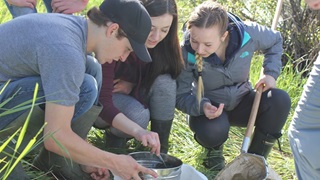Out of the classroom, and into the Manitoba marsh
Ducks Unlimited Canada’s Lizard Lake project offers wetland education, conservation
It starts with “critter dipping.” It eventually leads to critter loving . . . and critter protecting.
Ducks Unlimited Canada (DUC) has had a presence in wetland conservation at Lizard Lake, Manitoba, since 1985. Meanwhile, DUC’s educational outreach reinforces the wonders of the natural world—one bright, inquisitive young mind at a time.
“We caught a bunch of snails and side swimmers and shrimps,” says one Grade 4 student. “We’ve been learning all kinds of things about wetlands, and ducks, plants, and animals in the water. It’s really cool.”
In this corner of southwestern Manitoba, the Oak Hammock Marsh Interpretive Centre brings in educators and students from the region—while Ducks Unlimited Canada’s travelling Project Webfoot program takes elementary school kids outside.
“These programs get kids out of the classrooms and right into the marsh with some critter dipping. They’ll dip their nets into the water and see that it’s teeming with life. The kids leave with a better appreciation for wetlands, for wild areas,” says Shaun Greer, DUC’s head of habitat asset management.
“We need to preserve these wetland areas . . . but we also need to give kids and the public the opportunity to experience it,” adds Rick Andrews, DUC’s manager of provincial operations. “Once you appreciate and love something, you protect it.”
The Lizard Lake project is a conservation partnership between DUC, the Rural Municipalities of Thompson and Pembina, and the Pembina Valley Conservation District, among others.
Located between Miami and Manitou, Lizard Lake is one of DUC’s largest wetland conservation areas in Manitoba—with a 580-acre lake, and an additional 1,500-acre backflood area. For more than 30 years, that backflood area has offered early-season habitat for waterfowl, hay for landowners and local cattle producers, and environmental benefits, such as carbon storage and filtration of excess nutrients.
“Ducks Unlimited works primarily on private land. So we look for a win-win situation, where we can provide a nesting habitat and a benefit to a private landowner. This is a classic win-win,” says Andrews. “At the same time, the Lizard Lake project has a greater impact . . . it limits erosion, provides flood attenuation, and reduces the nutrient load in the watershed all the way to Lake Winnipeg.”
Enbridge takes environmental responsibility seriously, and we have a long history of working with DUC on conservation projects. In addition to sponsoring DUC educational initiatives in the region through Project Webfoot, Enbridge recently made a $100,000 donation to Lizard Lake project upgrades through our proposed Line 3 Replacement Program.
“We’re committed to being a responsible and considerate neighbor,” says Gina Jordan, Enbridge’s Calgary-based manager of community investment. “We deliver on that promise by investing in initiatives like Lizard Lake—initiatives that make these communities better places to live.”










